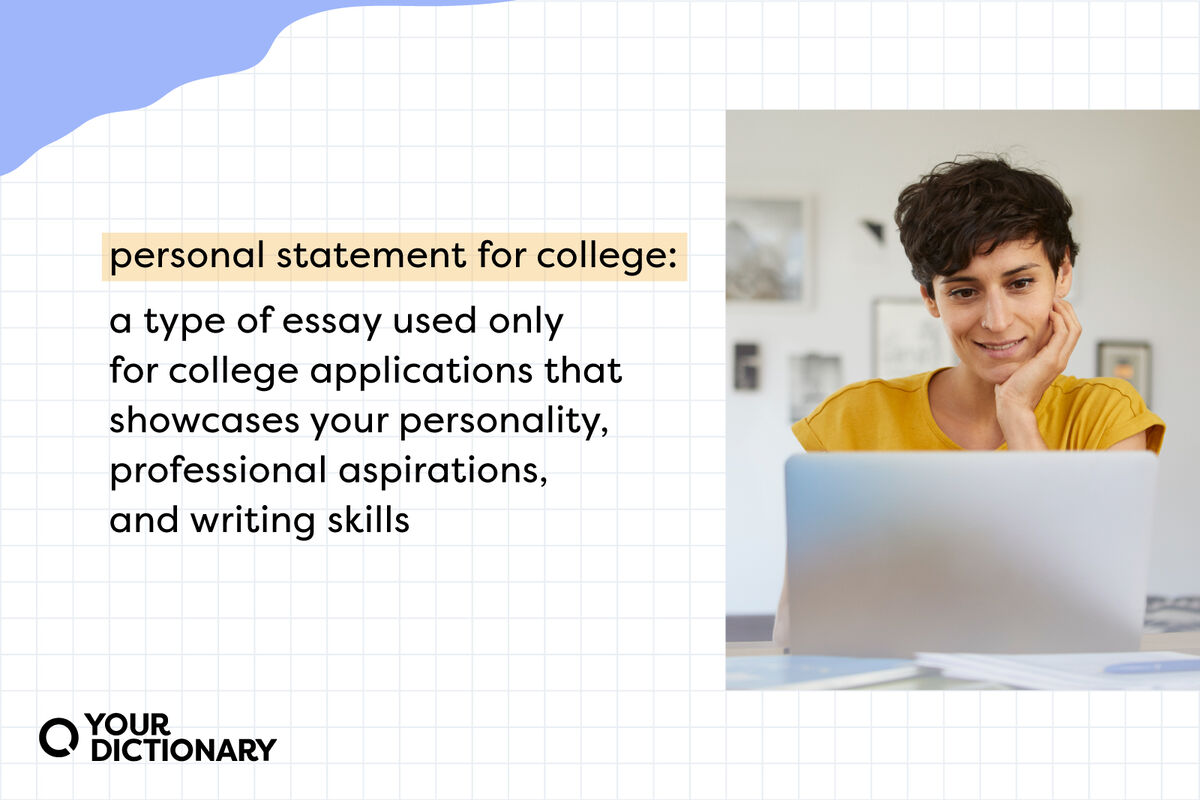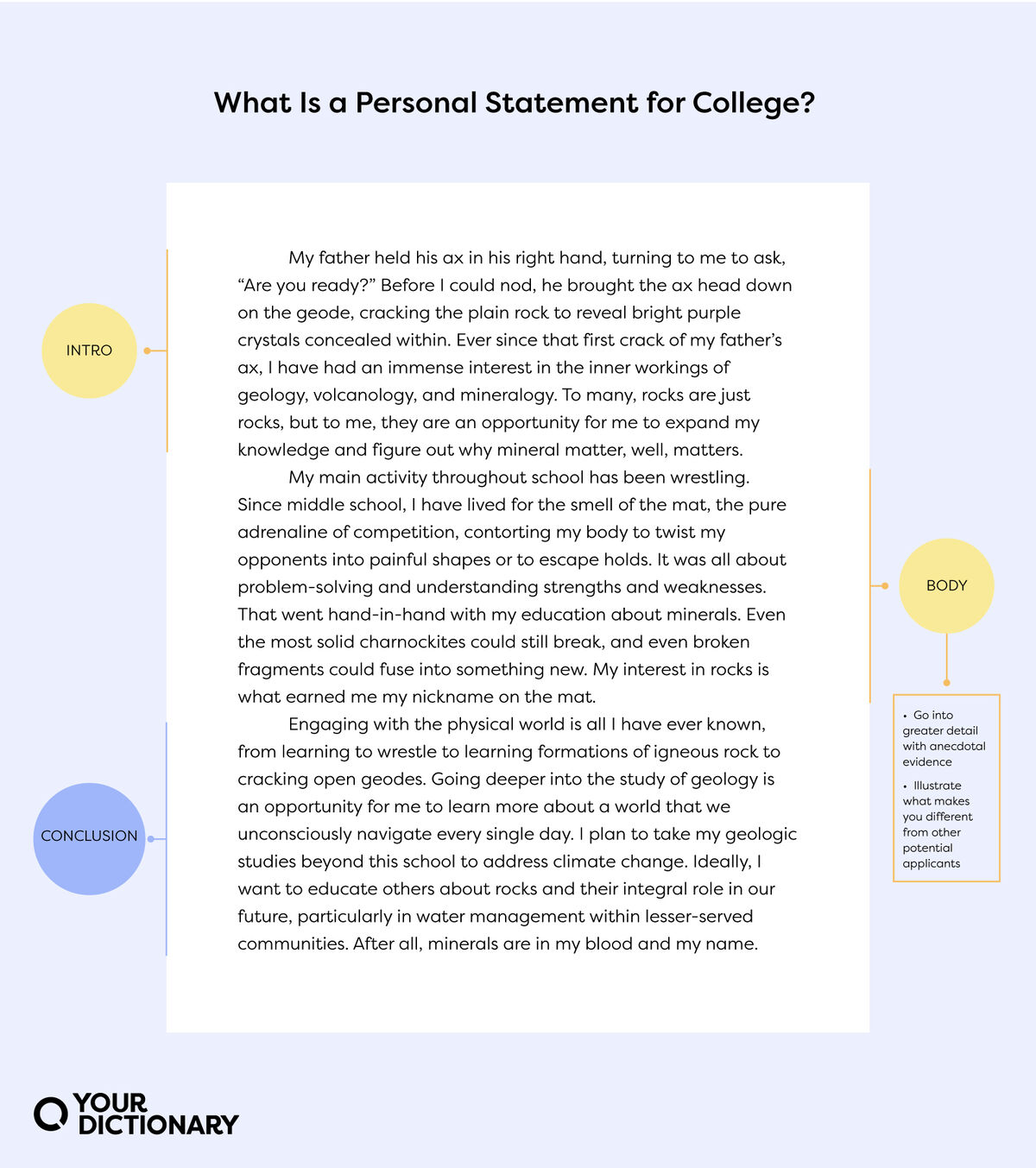
When applying to your colleges of choice, you’re probably thinking about your grades, your test scores, and all your extracurricular activities. Don’t forget your personal statement essay. It’s an integral part of your college application process, acting as the glue that holds all your different facets together. It’s also unlike any other essay you’ll ever write.
What Is a Personal Statement for College Applications?
Your personal statement is the main essay you’ll write when applying for college, and it demonstrates your writing ability while describing you as a person, all to show the college how you deal with challenges and face difficulties outside of grades and tests.
It’s not the only essay you’ll write for college applications, as some colleges will require supplemental essays, but every college will require a personal statement.
While personal statement and college application essay tend to be used interchangeably, personal statement usually applies to both undergraduate and graduate school. College essay is typically only reserved for undergrad.
What Is the Intent of a Personal Statement for College?
While it combines parts of other essay types, including narrative, personal, and persuasive essays, the personal statement is unique, specifically in its intent.
The main goals of a personal statement are to:
- Convince the reader (a college admissions officer) to accept you into their school
- Discuss who you are as a person, outside of test scores and transcripts
- Show off your writing skills and personal voice
Personal Statement Ideas and Topics
So what can you write about in your personal statement? In short: nearly anything. Most personal statements are fairly open-ended. Some schools may provide prompts, but even those are broad and allow for you to set your own terms.
Some of the most common prompts include:
- Reflect on a time when you faced a challenge or failure. How did you react to that moment, and what did you learn from that experience?
- Most people have a specific background or identity that is an integral part of how they engage with and navigate the world. Discuss that background and share your story.
- What is something important that you learned from a mentor? Describe your relationship with that mentor.
- Reflect on an experience that changed your perspective on your life and the world around you. That may include a trip abroad or volunteer work within your community.
- Describe your future. What does it look like five, 10, 50 years from now? That can include your career and academics, but consider beyond just your personal sphere. What do you want to do with your ideas to help your communities and the world at large?
- Consider how you might contribute to the vibrancy of the school and/or the field of academia in general. Describe these potential contributions and support them with evidence from your life.
In situations where the school doesn’t give you a prompt, you can write whatever you feel, but if you’re all out of ideas, it’s okay to turn to one of the prompts above.
How To Write a Personal Statement for College Applications
Your personal statement should be, well, personal. That means that there’s no one right way to write it. If there was, admissions officers would probably get bored out of their minds, and no one would go to college!
How To Format Your Personal Statement for College
Surprisingly, there is no actual set format for a personal statement. However, it’s a good idea to maintain a standard basic format, especially if you’re submitting the same essay to multiple schools.
Thankfully, you don’t need to overthink it. A personal statement isn’t all that different from, say, a five-paragraph essay, at least in terms of form.
- Introduction: A paragraph that hooks the admissions officer, introduces the basic answer to the prompt, and gives admissions a reason to continue reading
- Body: Go into greater detail with evidence and illustrate what makes you different from other potential applicants
- Conclusion: Connect the initial prompt to the larger question of what you can offer the school and how the experience will benefit you
Can you take risks in format? Maybe, but you’re more likely to confuse or alienate the admissions officer. At worst, it might seem a bit too gimmicky. It’s better to make the actual content of the essay unique.
How Long Should a Personal Statement Be?
The simplest answer: A personal statement should be as long as the school/prompt says it should be. Common App, which is an application system accepted by 1,000 schools and allows you to apply to multiple colleges at once, sets a maximum word limit at 650 (and a minimum of 250 words). Coalition App, a similar system for students from underrepresented groups, requires 500 to 650 words.
While you might see more variation with supplemental essays, all schools and application systems state specific word limits for personal statements. In the rare case where you don’t see a stated word limit, aim for about 500 to 600 words.
Tips for Writing a Personal Statement
The beauty of your personal statement (and really any piece of writing) is that you can truly make it your own, flex your writing skills, and embrace your personal story. Unfortunately, that’s easier said than done, but you can absolutely write a meaningful personal statement. Just give yourself enough time to do it.
Write More Than One Draft
One of the hardest things for any writer to understand is that drafts are a great tool. Don’t expect the first version of your personal statement to be the best one or the one that’ll get you accepted.
In fact, don’t be afraid to make your first draft messy.
- Have fun with it, and explore all the weird possibilities of writing your life.
- Ignore the idea of making your introduction and conclusion coherent.
- Don’t worry about word counts.
Just write your draft and see where your thought processes take you. The revision process is where you’ll refine everything.
Always Go Concrete Over Abstract
It is so easy to fall into generalizations and abstractions. You’re a good team player. You’re confident. You’re easygoing. See how this ends up being a list of basic qualities that almost anyone could use to describe themselves?
If you can, always go with the concrete examples over the abstractions. Talk about how you endured weeks of training, blisters, and carbo loading to go from couch potato to marathon finisher. Talk about the sweaty discomfort of singing in front of a crowd for the first time. It’s just so much more interesting, and unique, and it naturally builds narrative.
Be Your Own Cheerleader
This isn’t the time to be bashful or hide your accomplishments (unless it’s truly impossible to avoid or turn around). Be loud about your successes and accomplishments. You’ve earned that right, and admissions officers certainly want to hear about all the cool things that you’ve done.
Even worse, don’t go negative on yourself. You want admissions to feel positive about you at the end of the essay. That doesn’t mean everything needs a happy ending, but there’s a difference between recounting a negative experience and being self-deprecating or down on yourself.
Write About Something You’re Genuinely Interested In
Genuine interest and real enthusiasm are absolutely infectious. Even if it’s something that the reader isn’t interested in or knowledgeable about themselves, writing about something with honest enthusiasm can immediately pull the reader in.
Enthusiasm is almost impossible to fake, ensuring an honesty and sincerity that admissions officers specifically want.
Try To Include Your Personality in Your Writing
Remember the personal part of personal statements. Admissions wants to get to know you. Part of that means writing with a personality that is uniquely your own.
Granted, that’s a hard needle to thread when you’re also supposed to be relatively formal, but that doesn’t mean you need to be stuffy. Show vulnerability. Show that you’re not a robot. Admissions officers want to know about you.
Personal Statement Examples for College Applications
It’s easy to read a bunch of tips, take in all the stray advice from friends and counselors, and realize that you’re still confused about what a personal statement is even supposed to look like. Unfortunately, we can’t write your life for you, but we can give you a (rough) idea of what a personal statement could look like.

Introduction of Personal Statement
Unlike most other essay forms, personal statements aren’t thesis driven. Or at least not what you’d traditionally think of as a thesis. If you’re working with a prompt, your “thesis” is more of an answer to that prompt. In more open-ended cases, the “thesis” answers the broader question of why you’re applying to the school or program.
If you’re not sure how to begin your intro, start with a descriptive scene that sets the stage for the rest of the essay while drawing the reader into the experience. Remember, be concrete.
My father held his ax in his right hand, turning to me to ask, “Are you ready?” Before I could nod, he brought the ax head down on the geode, cracking the plain rock to reveal bright purple crystals concealed within. Ever since that first crack of my father’s ax, I have had an immense interest in the inner workings of geology, volcanology, and mineralogy. To many, rocks are just rocks, but to me, they are an opportunity for me to expand my knowledge and figure out why mineral matter, well, matters.
Body Paragraphs of Personal Statement
The body paragraphs are where you’ll dig into your topic of choice and get into your personal life to lend some credence to what you’re saying. This is your opportunity to explain your interests, your hobbies, and all the things that connect to you being interested in what you want to study.
My main activity throughout school has been wrestling. Since middle school, I have lived for the smell of the mat, the pure adrenaline of competition, contorting my body to twist my opponents into painful shapes or to escape holds. It was all about problem-solving and understanding strengths and weaknesses. That went hand-in-hand with my education about minerals. Even the most solid charnockites could still break, and even broken fragments could fuse into something new. My interest in rocks is what earned me my nickname on the mat.
Conclusion of Personal Statement
The conclusion ties everything together. Remember that it’s the last thing the admissions officer will read, so it should be memorable (in a good way). Connect your education with what you hope to actually do with that education.
Engaging with the physical world is all I have ever known, from learning to wrestle to learning formations of igneous rock to cracking open geodes. Going deeper into the study of geology is an opportunity for me to learn more about a world that we unconsciously navigate every single day. I plan to take my geologic studies beyond this school to address climate change. Ideally, I want to educate others about rocks and their integral role in our future, particularly in water management within lesser-served communities. After all, minerals are in my blood and my name.